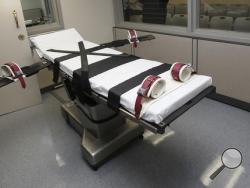OKLAHOMA CITY (AP) — The top lawyer for Oklahoma Gov. Mary Fallin urged prison officials to go forward with a planned execution even though they received the wrong drug, telling a deputy attorney general to "Google it" to confirm it could be used, a grand jury said in a report Thursday.
It faulted many officials for three botched execution attempts but issued no indictments after its months-long investigation. The panel noted that Fallin's general counsel, Steve Mullins, advocated for the use of potassium acetate in the Sept. 30 execution of Richard Glossip, even though the state's lethal injection protocol calls for potassium chloride, which stops the heart.
"The governor's general counsel stated potassium chloride and potassium acetate were basically one in the same drug, advising deputy attorney general to 'Google it,'" the grand jury report said. Mullins also argued that the state shouldn't file a stay for Glossip's execution because "it would look bad for the state of Oklahoma because potassium acetate had already been used in (Charles) Warner's execution."
A deputy attorney general said she did look up potassium acetate online and found that it wasn't one and the same. Fallin issued a last-minute stay for Glossip, who remains on death row.
Mullins resigned in February as Fallin's general counsel. A home phone number in his name rang unanswered Thursday.
"It is unacceptable for the governor's general counsel to so flippantly and recklessly disregard the written protocol and the rights of Richard Glossip," the grand jury said in its report.
Fallin praised the work of Attorney General Scott Pruitt and the grand jury and said she was still analyzing the report. But she expressed confidence in the ability of prison officials to carry out executions in the future. Oklahoma's court system had put executions on hold pending the grand jury's probe.
"With new management at the Department of Corrections, led by Interim Director Joe Allbaugh, I am confident we can move forward with a process that complies with the applicable policies, protocols and legal requirements," Fallin said.
Pruitt had called for the grand jury investigation after the provider of Oklahoma's execution drugs sent the wrong chemical for Glossip's scheduled Sept. 30 execution and said the report clearly outlined the problems in the system.
"A number of individuals responsible for carrying out the execution process were careless, cavalier and in some circumstances dismissive of established procedures," Pruitt said.
The head of the prison system, Robert Patton, and the penitentiary warden, Anita Trammell, also quit after appearing before the grand jury.
The report also was critical of Trammell, identified in the report as "Warden A," for not notifying anyone about the receipt of potassium acetate. It was revealed after Glossip's execution was called off that Warner had been executed with the same wrong drug in January 2015.
"Although the department and the state would have suffered embarrassment and criticism had Warden A told someone the wrong drug had been received for the Warner execution, potentially years of litigation and this investigation could have been avoided," the report said. "It is inexcusable for a senior administrator with 30 years as a department employee to testify that 'there are just some things you ask questions about, and there's some things you don't.'"
The drug mix-ups followed a botched execution in April 2014 in which inmate Clayton Lockett struggled on a gurney before dying 43 minutes into his lethal injection — and after the state's prisons chief ordered executioners to stop.
The grand jury suggested the state should study the use of nitrogen gas to administer the death penalty, saying it would be "easy and inexpensive to obtain" and "simple to administer." Oklahoma now uses a three-drug protocol, beginning with the surgical sedative midazolam, in its executions. But the Oklahoma Legislature last year authorized the use of nitrogen gas in executions if lethal injection were ever ruled unconstitutional or if the drugs became unavailable. Nitrogen gas has never been used to execute inmates in the U.S.
Pruitt has said he will not ask the court to schedule any execution dates until at least 150 days — or about five months — after the grand jury results were released and his office is officially notified that the prisons system believes it can execute prisoners according to the state's guidelines. In the meantime, five Oklahoma death row inmates have exhausted their appeals and are awaiting execution dates.
Dale Baich, an assistant federal public defender representing several death row inmates challenging Oklahoma's lethal injection protocol, said executions should remain on hold pending an independent panel led by former Oklahoma Gov. Brad Henry.
"The moratorium on executions should continue in order to allow the commission to complete its study and for the federal litigation to be resolved," Baich said.
___
Follow Sean Murphy at www.twitter.com/apseanmurphy

